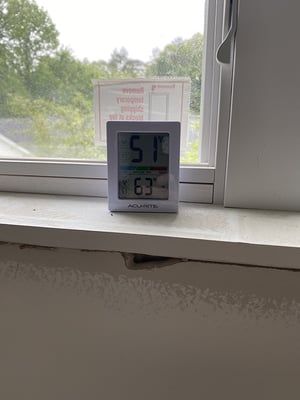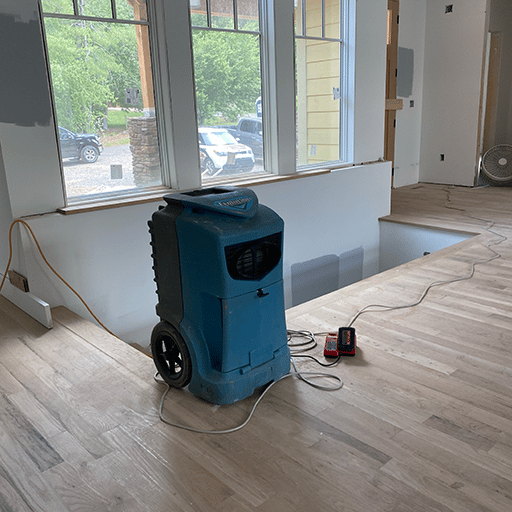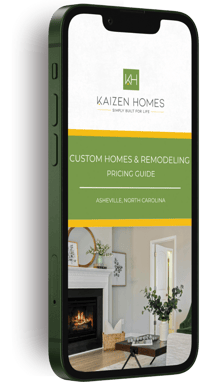3 Min Read
Building Better: Climate Control During Construction
Climate control during construction is one of the simplest ways to ensure your home’s materials perform as they should for years to come. How do you protect the investment you’re making in your custom home?
In Western North Carolina, the weather changes a lot with the seasons, elevation, and time of day. It is important to manage temperature, humidity, and air quality from the start. At Kaizen Homes, we make climate control a standard part of our process.
Table of contents
Why Climate Control Matters During Construction
Protecting Materials and Quality Once your home is “dried-in,” with windows, doors, and a roof installed, it’s critical to begin climate control. Framing lumber and other materials need time to dry out and acclimate. If you don’t address moisture at this stage, materials can warp, shrink, or crack. Drywall introduces even more moisture as it dries, and inconsistent humidity levels can lead to uneven drying and cracking.
Wood floors naturally expand and contract with seasonal humidity changes. By addressing humidity levels during construction, we ensure your flooring stabilizes before installation, minimizing future movement and protecting its integrity for years to come. By controlling the climate during construction, you prevent these issues, ensuring the materials remain in peak condition.
Long-Term Benefits When materials acclimate properly during construction, the result is a stronger, more durable home. This also reduces the likelihood of callbacks for repairs, saving time and money. This means fewer touch-ups and a home built to last, giving you peace of mind that every detail has been carefully managed.

The Challenges of Western North Carolina’s Climate
In Western North Carolina, humidity levels fluctuate widely depending on the season and elevation. Summers are humid, with levels reaching 60-80%. Winters, on the other hand, bring drier air, with humidity levels dropping as low as 30-50%. Some days we see all of the seasons in one day! These swings can wreak havoc on your home’s materials if not managed.
- Summer: High humidity can cause wood to absorb moisture, leading to swelling and warping.
- Winter: Dry air can pull moisture out of wood, causing it to shrink and crack.
Our Solution: We use dehumidifiers, HVAC systems, and air circulation tools. These help keep humidity levels between 40-60%. We also do our best to maintain temperatures around 60-72°F. These are the best conditions for construction.
How Kaizen Homes Does It
Monitoring and Equipment We don’t leave anything to chance. Our team uses Bluetooth thermometers and humidity meters. We monitor the site’s conditions to understand the air quality. This ensures the environment remains optimal for materials. Commercial-grade dehumidifiers and package air handler units actively control humidity and airflow throughout the project.


Step-by-Step Approach
- Concrete Slab: Concrete holds moisture and dries out over time. Pulling the moisture from the concrete allows the other materials in the home to equalize their moisture content faster.
- Immediately After Framing: Lumber needs time to dry out. Airflow and dehumidification stabilize moisture levels before installing insulation.
- During Drywall Installation: Drywall mud introduces significant moisture. We increase airflow and maintain consistent humidity to ensure even drying, preventing cracks.
- Finish Installation: When floors, cabinets, and trim are installed, climate control becomes even more critical. Materials must acclimate to the home’s conditions to avoid damage.
Climate Control for Worker Comfort and Productivity
Climate control doesn’t just benefit materials—it’s a game-changer for workers, too. On days when the weather is extreme, having a climate-controlled job site boosts morale and keeps the project moving. Workers are more likely to show up and perform their best when the conditions are comfortable. This means better craftsmanship and a more efficient timeline for your home.
It’s not just about making the job easier for workers—it’s about creating the conditions for precision and high-quality craftsmanship. When you invest in a comfortable jobsite, you’re also investing in the integrity and durability of your custom home.
Transitioning to Permanent Systems
Once your home receives its Certificate of Occupancy, the power company will hook up permanent power. Our electricians validate the connection, ensuring everything is safe and operational. Then, the HVAC contractor activates your home’s permanent climate control systems. With water already available and ready to connect, your home’s systems will work well. Your Simply Built Home will be healthy and efficient.

The Smart Choice for Every Custom Home
In Asheville, NC, and all over Western North Carolina, climate control during construction is not just smart. It is the standard for building strong, long-lasting homes. This investment protects materials, boosts worker productivity, and ensures long-term comfort. It pays off for you in many ways.
Kaizen Homes will show you how climate control ensures your custom home lasts. Contact us today to start the conversation about building your dream home in Western North Carolina.


